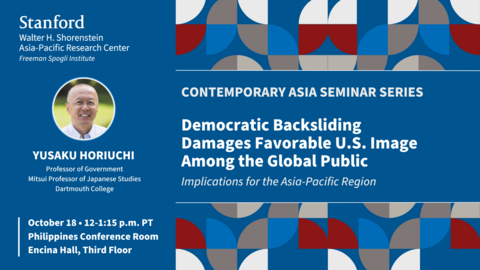Democratic Backsliding Damages Favorable U.S. Image Among the Global Public: Implications for the Asia-Pacific Region
Democratic Backsliding Damages Favorable U.S. Image Among the Global Public: Implications for the Asia-Pacific Region
Friday, October 18, 202412:00 PM - 1:15 PM (Pacific)
Encina Hall, Third Floor, Central, C330
616 Jane Stanford Way, Stanford, CA 94305

U.S. democracy has weakened during the 21st century, raising questions about whether this process risks eroding its foreign image, which centers on its longstanding democratic government. Scholars predict that democratic backsliding reduces favorable views of the U.S. among foreign citizens. They also claim that it undercuts the U.S.’s ability to win foreign policy cooperation from international partners. We assess these views based on a three-wave, multinational survey experiment fielded in twelve countries with 12,611 respondents. The results show democratic backsliding significantly decreases respondents’ favorability toward the U.S. However, there is little evidence that democratic backsliding decreases support for cooperating with the U.S. These findings suggest that while America’s image may suffer, its ability to garner support for critical policies remains resilient in some regions.
This event is part of our Contemporary Asia Seminar Series. This series hosts professionals in the fields of public and foreign policy, journalism, and academia who share their perspectives on pressing issues facing Asia today.
Speaker:

Yusaku Horiuchi is a Professor of Government and Mitsui Professor of Japanese Studies at Dartmouth College. His research utilizes experimental designs and statistical methods to address diverse empirical questions in political science, particularly focusing on foreign/global public opinion, Japanese Politics, diversity, elections, and political methodology. He has published widely in top journals, including American Political Science Review, American Journal of Political Science, Journal of Politics, Political Analysis, and Science Advances, and authored two books. His research draws on data from Japan and other countries such as Australia, Israel, South Korea, the United Kingdom, and the United States. At Dartmouth, He teaches courses on Quantitative Political Analysis, Data Visualization with R, and the Politics of Japan. He holds an M.A. in international and development economics from Yale University and a Ph.D. in political science from MIT. He has also held visiting appointments at Keio University, ANU, and MIT.
